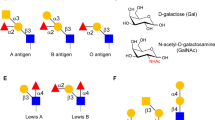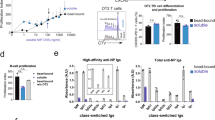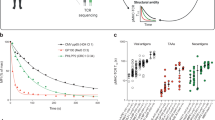Abstract
Here we describe how to isolate carbohydrate-specific T cell clones (for which we propose the designation 'Tcarbs') after stimulation by two glycoconjugate vaccines. We describe how to prepare, purify and characterize two model glycoconjugate vaccines that can be used to generate Tcarbs. These glycoconjugate vaccines (GBSIII-OVA and GBSIII-TT) are synthesized by conjugation of type III group B streptococcal polysaccharide (GBSIII) to ovalbumin (OVA) or tetanus toxoid (TT). Upon immunization of mice with GBSIII-OVA, carbohydrate epitopes are presented to and recognized by CD4+ T cells. Subsequently, polysaccharide-recognizing CD4+ T cells are expanded in vitro by stimulating splenic CD4+ T cells with GBSIII-TT. The sequential use of two distinct glycoconjugate vaccines containing the same polysaccharide conjugated to heterologous carrier proteins selects for and expands carbohydrate-specific T cells. This protocol can readily be adapted to study the stimulation of the immune system by alternative glycoconjugate vaccines. This protocol takes 1–2 years to complete.
This is a preview of subscription content, access via your institution
Access options
Subscribe to this journal
Receive 12 print issues and online access
$259.00 per year
only $21.58 per issue
Buy this article
- Purchase on Springer Link
- Instant access to full article PDF
Prices may be subject to local taxes which are calculated during checkout




Similar content being viewed by others
References
Avci, F.Y., Li, X., Tsuji, M. & Kasper, D.L. A mechanism for glycoconjugate vaccine activation of the adaptive immune system and its implications for vaccine design. Nat. Med. 17, 1602–1609 (2011).
Coutinho, A. & Moller, G. B cell mitogenic properties of thymus-independent antigens. Nat. New Biol. 245, 12–14 (1973).
Barrett, D.J. Human immune responses to polysaccharide antigens: an analysis of bacterial polysaccharide vaccines in infants. Adv. Pediatr. 32, 139–158 (1985).
Guttormsen, H.-K. et al. Cognate stimulatory B-Cell-T-Cell interactions are critical for T-cell help recruited by glycoconjugate vaccines. Infect. Immun. 67, 6375–6384 (1999).
Guttormsen, H.K., Wetzler, L.M., Finberg, R.W. & Kasper, D.L. Immunologic memory induced by a glycoconjugate vaccine in a murine adoptive lymphocyte transfer model. Infect. Immun. 66, 2026–2032 (1998).
Avci, F.Y. & Kasper, D.L. How bacterial carbohydrates influence the adaptive immune system. Annu. Rev. immunol. 28, 107–130 (2010).
Beuvery, E.C., Van Rossum, F. & Nagel, J. Comparison of the induction of immunoglobulin M and G antibodies in mice with purified pneumococcal type III and meningococcal group C polysaccharides and their protein conjugates. Infect. Immun. 37, 15–22 (1982).
Schneerson, R., Barrera, O., Sutton, A. & Robbins, J.B. Preparation, characterization, and immunogenicity of Haemophilus influenzae type b polysaccharide-protein conjugates. J. Exp. Med. 152, 361–376 (1980).
Wessels, M.R. et al. Stimulation of protective antibodies against type Ia and Ib group B streptococci by a type Ia polysaccharide-tetanus toxoid conjugate vaccine. Infect. Immun. 61, 4760–4766 (1993).
Weintraub, A. Immunology of bacterial polysaccharide antigens. Carbohydr. Res. 338, 2539–2547 (2003).
Mitchison, N.A. T-cell–B-cell cooperation. Nat. Rev. Immunol. 4, 308–312 (2004).
Colino, J. et al. Parameters underlying distinct T cell-dependent polysaccharide-specific IgG responses to an intact Gram-positive bacterium versus a soluble conjugate vaccine. J. Immunol. 183, 1551–1559 (2009).
Deck, B., Elofsson, M., Kihlberg, J. & Unanue, E.R. Specificity of glycopeptide-specific T cells. J. Immunol. 155, 1074–1078 (1995).
Harding, C.V., Kihlberg, J., Elofsson, M., Magnusson, G. & Unanue, E.R. Glycopeptides bind Mhc molecules and elicit specific T-cell responses. J. Immunol. 151, 2419–2425 (1993).
Dzhambazov, B. et al. The major T cell epitope on type II collagen is glycosylated ion normal cartilage but modified by arthritis in both rats and humans. Eur. J. Immunol. 35, 357–366 (2005).
Jones, C. Vaccines based on the cell surface carbohydrates of pathogenic bacteria. An. Acad. Bras. Cienc. 77, 293–324 (2005).
Vliegenthart, J.F.G. Carbohydrate-based vaccines. FEBS Lett. 580, 2945–2950 (2006).
Wessels, M.R. et al. Immunogenicity in animals of a polysaccharide-protein conjugate vaccine against type III group B Streptococcus. J. Clin. Invest. 86, 1428–1433 (1990).
Acknowledgements
This work was supported by the following: US National Institutes of Health grants AI-089915, AI-070258 and AI-081510; and by funding from Novartis Vaccines, Siena, Italy.
Author information
Authors and Affiliations
Contributions
F.Y.A., X.L., M.T. and D.L.K. designed the research; F.Y.A. and X.L. performed the research; F.Y.A., X.L., M.T. and D.L.K. wrote the paper. F.Y.A. and X.L. contributed equally.
Corresponding authors
Ethics declarations
Competing interests
The authors declare no competing financial interests.
Rights and permissions
About this article
Cite this article
Avci, F., Li, X., Tsuji, M. et al. Isolation of carbohydrate-specific CD4+ T cell clones from mice after stimulation by two model glycoconjugate vaccines. Nat Protoc 7, 2180–2192 (2012). https://doi.org/10.1038/nprot.2012.138
Published:
Issue Date:
DOI: https://doi.org/10.1038/nprot.2012.138
This article is cited by
-
Neutrophil-derived reactive oxygen species promote tumor colonization
Communications Biology (2021)
-
Shotgun Glycomics Identifies Tumor-Associated Glycan Ligands Bound by an Ovarian Carcinoma-Specific Monoclonal Antibody
Scientific Reports (2017)
-
Camel Streptococcus agalactiae populations are associated with specific disease complexes and acquired the tetracycline resistance gene tetM via a Tn916-like element
Veterinary Research (2013)
Comments
By submitting a comment you agree to abide by our Terms and Community Guidelines. If you find something abusive or that does not comply with our terms or guidelines please flag it as inappropriate.



